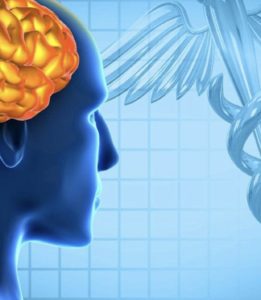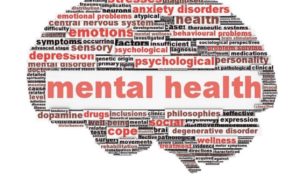Original article link https://psychcentral.com/lib/the-relationship-between-mental-and-physical-health/

The Relationship Between Mental & Physical Health
People with depression often have worse physical health, as well as worse self-perceived health, than those without depression.
Depression and other physical health conditions have separate but additive effects on well-being. For example, the combination of heart disease and depression can cause twice the reduction in social interaction than either condition alone.
Patients with both depression and physical health problems are at particular risk: The physical problem can complicate the assessment and treatment of depression by masking or mimicking its symptoms.
It can work the other way as well. People with any chronic physical disease tend to feel more psychological distress than do healthy people. Poor physical health brings an increased risk of depression, as do the social and relationship problems that are very common among chronically ill patients.
Heart Disease & Depression Go Hand in Hand
A 2009 study of patients with severe chronic obstructive pulmonary disease found that 22 percent of the participants had at least mild depression, defined as a score of 14 or more on the widely-used Beck Depression Inventory. Seventeen percent were taking antidepressants. The researchers say that for these patients, “depression is an independent determinant of health-related quality of life.”
Professor David Goldberg of the Institute of Psychiatry, London, reports that the rate of depression in patients with a chronic disease is almost three times higher than normal. “Depression and chronic physical illness are in reciprocal relationship with one another: not only do many chronic illnesses cause higher rates of depression, but depression has been shown to antedate some chronic physical illnesses.”
He states that depression which occurs together with physical illness is less well diagnosed than depression occurring on its own. “Depression among those with chronic physical illnesses is likely to be missed by professionals who care for physically sick patients,” he writes in the journal World Psychiatry.
“This is because health professionals are understandably concerned with the physical disorder which is usually the reason for the consultation, and may not be aware of the accompanying depression.”
Depressive illness can also precede a physical disease. It has been linked to coronary heart disease, stroke, colorectal cancer, back pain, irritable bowel syndrome, multiple sclerosis, and possibly type 2 diabetes.
Treatment of Mental Health Concerns is Key
Professor Goldberg believes that untreated depression causes much unnecessary suffering, whereas effective treatment can decrease disability, prolong survival and increase quality of life.
He suggests that treatment consist of giving “the least intrusive, most effective intervention first.” The primary care physician should have overall responsibility for the patient, but a case manager and a mental health specialist (psychiatrist or clinical psychologist) should provide further support.
Less severe depression may be helped by lifestyle advice on sleep and physical activity, modified to take account of any physical disabilities. Other treatments include cognitive-behavioral therapy, either as a self-help program, computer-based, or with a therapist in groups or individually.
“There is no good evidence that one antidepressant is superior to another in the treatment of depression among those with physical illnesses,” says Professor Goldberg, “and perhaps the most important consideration when choosing an antidepressant for these patients is the nature of the treatment being given for the physical illness.”
Certain antidepressants work better alongside beta-blockers, for example, and others work less well with serotonin receptor agonists prescribed for migraine, or monoamine oxidase inhibitors for Parkinson’s disease. Older antidepressants, such as tricyclics and St. John’s wort, should be avoided in physically ill patients, since they are each associated with a wide range of interactions with other drugs.
Although depression can be treated effectively, there is no clear evidence that this treatment improves the physical illness. But it does have other beneficial effects such as improvements in social and emotional functioning, perceived disability and fatigue.
A 2003 study found that the treatment of depression in arthritis patients led to improved arthritis-related pain intensity, less interference with daily activities due to arthritis, and better overall health status and quality of life.
Professor Goldberg concludes, “The weight of the evidence suggests that, in addition to reducing depressive symptoms, treatment of depression is effective in reducing functional disability. One of the reasons for persevering with active treatment for depression is that even if the outlook for survival is poor, quality of life may still be improved.”
References
Moy, M. L. et al. Multivariate models of determinants of health-related quality of life in severe chronic obstructive pulmonary disease. The Journal of Rehabilitation Research and Development, Vol. 46, 2009, pp. 643-54.
Goldberg D. The detection and treatment of depression in the physically ill. World Psychiatry, Vol. 9, February 2010, pp. 16-20.
Lin, E. H. et al. Effect of improving depression care on pain and functional outcomes among older adults with arthritis: a randomized controlled trial. The Journal of the American Medical Association, Vol. 290, November 2003, pp. 2428-29.
Original article link https://psychcentral.com/lib/the-relationship-between-mental-and-physical-health/


